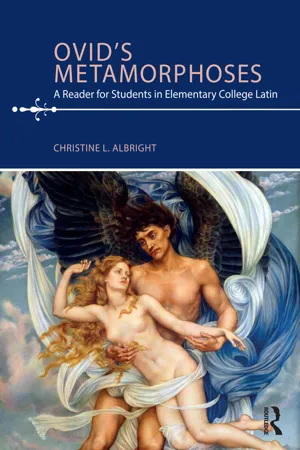
Ovid's Metamorphoses
A Reader for Students in Elementary College Latin
- 210 pages
- English
- ePUB (mobile friendly)
- Available on iOS & Android
About this book
Ovid's Metamorphoses is a Latin reader designed to partner existing elementary Latin textbooks.
The book features thirty compelling stories, graduated in difficulty and adapted from Ovid's epic Metamorphoses into prose. The original poem contains many different stories united thematically by the transformation which occurs in all of them; the epic features romance, seduction, humour, violence, monsters, and misbehaving gods.
Each chapter contains:
- a Latin passage adapted from the epic
- an accompanying vocabulary list
- a short commentary to help with translation
- a concise review of the specific grammar covered
- a brief comment on a literary aspect of the poem, or featured myth.
Suitable for college students studying Latin at the elementary level, Ovid's Metamorphoses is designed to be used alongside elementary Latin textbooks. Preserving Ovid's language and highly vivid descriptions, this reader introduces students to the epic masterpiece, allows them to consolidate their understanding of Latin prose, and offers opportunities for literary discussion.
Christine Albright is the 2020 recipient of the CAMWS Bolchazy Pedagogy Book Award.
Frequently asked questions
- Essential is ideal for learners and professionals who enjoy exploring a wide range of subjects. Access the Essential Library with 800,000+ trusted titles and best-sellers across business, personal growth, and the humanities. Includes unlimited reading time and Standard Read Aloud voice.
- Complete: Perfect for advanced learners and researchers needing full, unrestricted access. Unlock 1.4M+ books across hundreds of subjects, including academic and specialized titles. The Complete Plan also includes advanced features like Premium Read Aloud and Research Assistant.
Please note we cannot support devices running on iOS 13 and Android 7 or earlier. Learn more about using the app.
Information
1 Creation begins
Commentary
Table of contents
- Cover
- Half Title
- Title Page
- Copyright Page
- Dedication
- Table of Contents
- Acknowledgements
- Abbreviations
- Introduction
- 1 Creation begins: (Met. 1.5–150)
- 2 Creation continues: (Met. 1.5–150)
- 3 Lycaon: (Met. 1.163–252)
- 4 Deucalion and Pyrrha: (Met. 1.313–415)
- 5 Apollo and Python: (Met. 1.416–451)
- 6 Apollo and Daphne: (Met. 1.452–567)
- 7 Phaethon: (Met. 2.1–400)
- 8 Cadmus and the founding of Thebes: (Met. 3.1–137)
- 9 Actaeon: (Met. 3.138–252)
- 10 Semele: (Met. 3.253–315)
- 11 Tiresias: (Met. 3.316–38)
- 12 Bacchus and Pentheus: (Met. 3.511–733)
- 13 Mars and Venus: (Met. 4.167–89)
- 14 Salmacis and Hermaphroditus: (Met. 4.274–388)
- 15 The transformation of Cadmus: (Met. 4.563–603)
- 16 Perseus and Atlas: (Met. 4.604–62)
- 17 Perseus and Andromeda: (Met. 4.663–803)
- 18 The rape of Proserpina: (Met. 5.346–571)
- 19 Arachne and Minerva: (Met. 6.1–145)
- 20 Niobe: (Met. 6.146–312)
- 21 Tereus, Procne, and Philomela: (Met. 6.401–674)
- 22 Boreas and Orithyia: (Met. 6.675–721)
- 23 Medea’s rejuvenation of Aeson: (Met. 7.159–293)
- 24 Medea’s punishment of Pelias: (Met. 7.294–349)
- 25 Scylla and Nisus: (Met. 8.1–151)
- 26 Pomona and Vertumnus: (Met. 14.623–771)
- 27 Quirinus: (Met. 14.805–51)
- 28 Cipus: (Met. 15.547–621)
- 29 Aesculapius: (Met. 15.622–744)
- 30 The apotheosis of Caesar: (Met. 15.745–870)
- Glossary
- Index